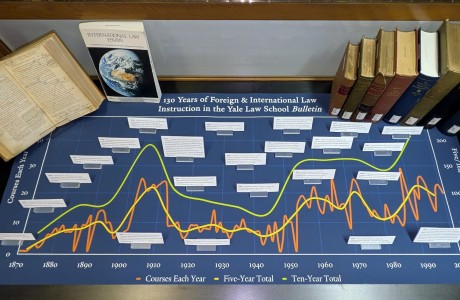News from Poland, Ukraine, Russia
Chernobyl is open to tourists!
Moscow News - 20 March 2011
Ukraine announced official tours of the1986 nuclear disaster and open the sealed zone around the Chernobyl reactor to visitors who wish to learn more about the tragedy that occurred nearly a quarter of a century ago. Chernobyl's reactor No. 4 exploded on April 26, 1986, spewing radiation over a large swath of northern Europe. Hundreds of thousands of people were resettled from areas contaminated with radiation fallout in Ukraine, Belarus and Russia. Related health problems still persist.

Today, radiation directly next to the sarcophagus encasing Block 4 is around 3 per hour. On an intercontinental flight you will receive around 5 microsieverts per hour due to cosmic radiation at high altitudes. So, technically a trip to Chernobyl is healthier than crossing the Atlantic.
You can read more from Time online.
The Law Library has several works related to this topic. See, for example:
- Chernobyl, the Forbidden Truth by Alla Yaroshinskay (1995)
- Chernobyl: Law and Communication: Transboundary Nuclear Air Pollution - The Legal Materials edited by Philippe Sands (1988)
Relevant subject headings include:
- nuclear power plants - ukraine - accidents
- liability for nuclear damages
- radioactive pollution - law and legislation
- chernobyl nuclear accident, chornoby'l, ukraine, 1986
- nuclear crisis control
-------------------------------------------------------------------------------------------------------------------
Poland Grounds Tu-154M
The Associated Press - 28 March 2011
Poland has taken its remaining Soviet-made Tu-154M government plane out of service. President Lech Kaczynski and 95 others in the Smolensk region last April were killed when the Tu-154M crashed. Poland pulled the remaining Tu-154M from service after Russia ordered airlines to stop using Tu-154B aircraft following a fire and explosion that killed three people in January. A Russian report on the April crash found no fault with the plane.

The Law Library has a collection of both foreign and domestic aviation law and safety. See, for example:
- Why Airplanes Crash: Aviation Safety in a Changing World by Clinton V. Oster, Jr., John S. Strong, C. Kurt Zorn
- Aviation Law & Policy Series by various authors
Relevant subject headings include
- aeronautics - law and legislation
- aircraft accidents
- aircraft accidents - united states
---------------------------------------------------------------------------------------------------------------------
Russia Sets Forward Clocks for the Last Time
Combined Reports - 28 March 2011
Russia is permanently on daylight-saving time after people set their clocks ahead one hour early on Sunday under a decree from President Dmitry Medvedev.
Medvedev, who has already tinkered with time by reducing the number of the country's time zones to nine from 11, has said switching clocks back and forth is bad for health.
Scientific studies show more suicides and heart attacks occur immediately after a shift to daylight-saving time, and that switching clocks back and forth causes more pollution.
Russia has been grappling for decades with issues of time in a country that stretches across 10,000 kilometers and whose northernmost reaches see less than an hour of sunlight a day during the winter months. The first recorded time change occurred in July 1917, and after several time-change reforms, daylight-saving time was introduced in 1981.
A poll conducted in February indicated that about 60 percent of Russians support Medvedev's decision to permanently set Moscow's time four hours ahead of Greenwich Mean Time, RIA-Novosti reported.
A Kremlin handout earlier this year, citing experts, said that depending on the region, the change would increase the amount of perceived daylight by 7 to 17 percent.
Russia's abolition of wintertime will, however, boost annual electricity consumption by 1 billion kilowatts per hour, or 0.01 percent of total usage, the Kremlin handout read, because mornings will be darker and people will need to use more energy.
"Since 1916, countries have, to one degree or another, been 'experimenting' with time, and I think the process is likely to continue," said Vladimir Krutikov, deputy head of the Federal Service for Technical Regulations and Measures, RIA-Novosti reported.
More than 100 countries, including the European Union and most U.S. states, use daylight-saving time. In ending the practice, Russia joins Japan, China, South Korea and the former Soviet republics of Tajikistan, Turkmenistan, Uzbekistan, Kyrgyzstan, Kazakhstan and Georgia in not changing clocks seasonally, Itar-Tass reported.
The Law Library has a rich collection of Russian Law. The Russian National Library also contains scanned historical works and current law and legislation available to the public. To begin researching the law of Russia, start with our Country-by-Country guide to Foreign Law Research.

